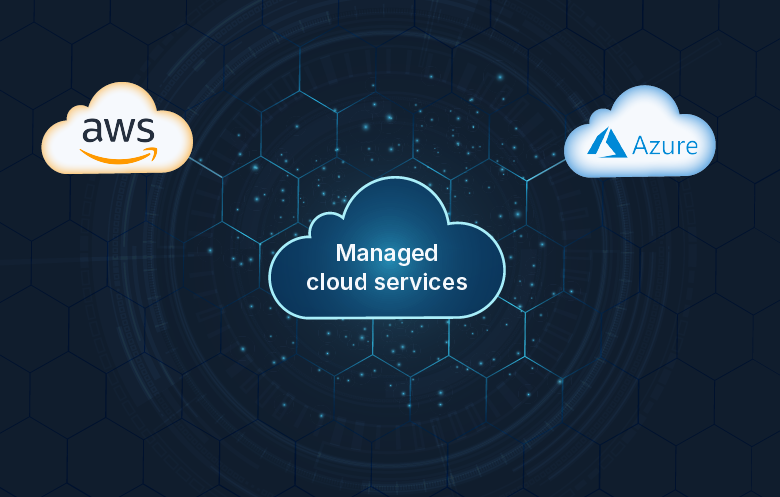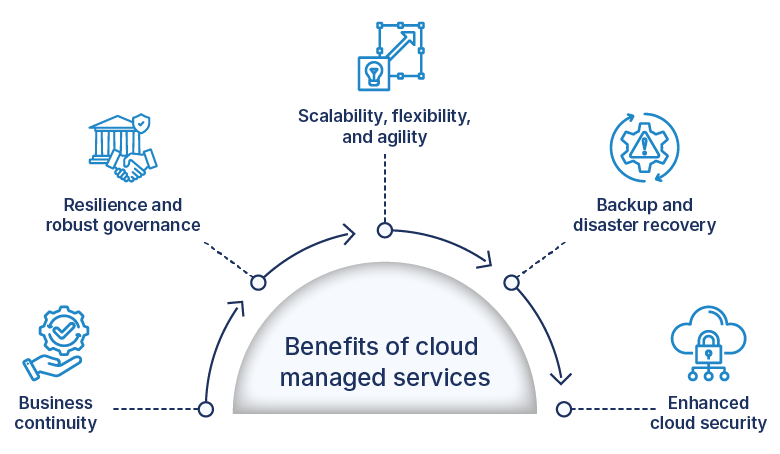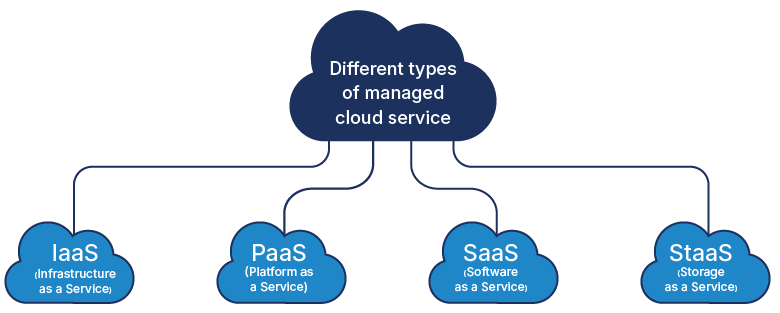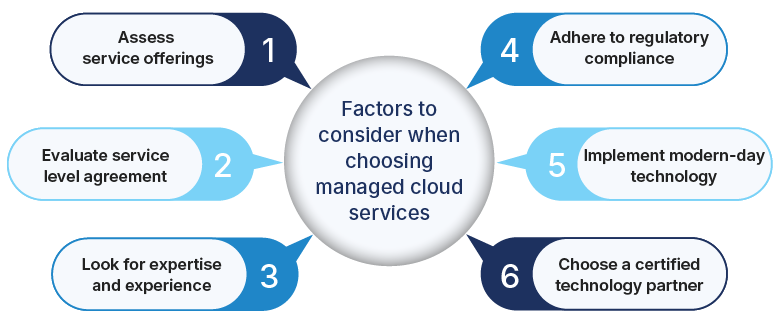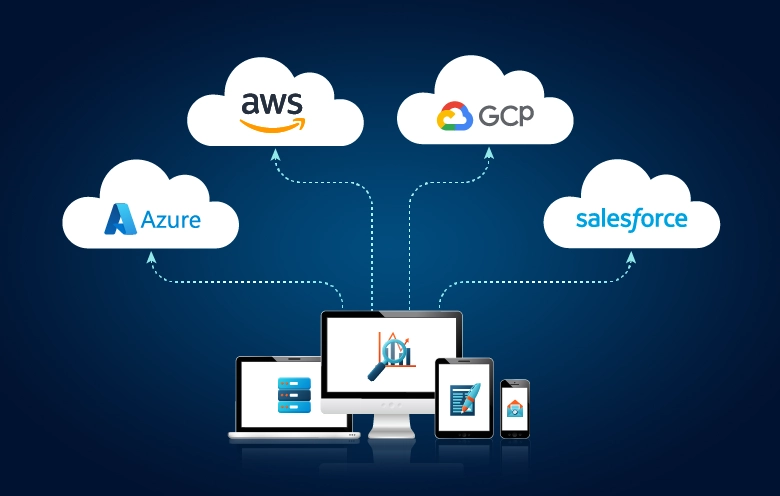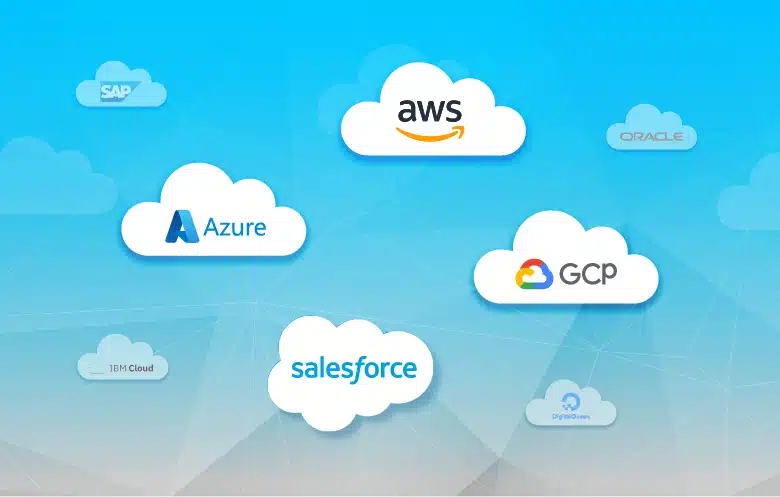Cloud computing has transformed the way businesses function by offering scalability, agility, and flexibility. However, realizing these benefits is not easy. Managing cloud infrastructure can be challenging and resource-intensive, requiring specialized knowledge and continuous monitoring. This is where cloud-managed services come into play, helping organizations optimize their cloud environment.
In this blog post, we will explore what are managed cloud services, why businesses need cloud services, and how the right partner can help you achieve lasting value—without the complexity or waste that often comes with unmanaged cloud environments.
What are managed cloud services?
A cloud-managed service is the partial or complete outsourcing of a client’s cloud infrastructure and services to a third-party provider. The managed cloud service provider typically offers 24/7 help desk support, engineering on demand, hosting, and implementation.
Managed cloud services include cloud optimization, security and compliance, system upgrades, and infrastructure maintenance, in the native cloud ecosystem.
Organizations can streamline the process by storing and migrating critical data to the cloud thus enhancing accessibility and agility. Cloud service enables organizations to scale their infrastructure as per the business requirement.
Why do organizations need cloud-managed services?
Now that we have understood what cloud-managed service is, let’s understand how organizations can benefit from cloud-managed services across the board.
1. Business continuity
Business continuity ensures organizations improve productivity. Managed cloud services reduce the need for hiring or training new staff by offloading operational workloads. This enables internal teams to focus on strategic initiatives.
2. Resilience and robust governance
Resilience and robust governance protect organizations from disaster and downtime. Organizations that adopt multi-cloud strategies like cloud deployment and management for better resilience, reduce cost, quickly launch new products in the market, and enhance customer experience. This helps organizations store vital data, enhance productivity and improve visibility.
3. Scalability, flexibility, and agility
Scalability and flexibility allow you to alter your IT infrastructure based on your business needs. Managed cloud service empowers your business with flexibility and agility to scale your cloud resources with the expanding needs of your business. It offers affordable resources without security threats in the cloud environment.
4. Backup and disaster recovery
Disruptive events can occur anytime; thus, it is vital to have a disaster recovery plan that enables you to recover data when lost. Cloud-managed IT service helps you get the backup and restore the data minimizing downtime and enhancing productivity.
5. Enhanced cloud security
Security is a primary concern for all businesses. Managed cloud service providers implement robust security measures, including 24/7 threat monitoring, multifactor authentication, and adherence to compliance regulations.
What are the common types of managed cloud services?
It’s important to understand the different types of managed cloud service offered by the service provider to choose the best one that enhances productivity and saves time for your business. Let’s dive in:
1. IaaS (Infrastructure as a Service)
This model offers enterprises computing resources like virtual networks, storage, and servers without them needing to make infrastructure and hardware investments. It offers the scalability and flexibility that businesses need to control and access the servers, systems, storage, firewalls, and networks.
2. PaaS (Platform as a Service)
Platform as a Service is a combination of the services offered by IaaS and other services and tools to simplify the entire process and make it more efficient to help business operate more efficiently. This is ideal for developers who would like to develop applications with the infrastructure seamlessly handled in the background. Developers can concentrate on coding and software development as cloud infrastructure management services provide a pre-configured environment.
3. SaaS (Software as a Service)
SaaS applications enable organizations to make use of advanced tools ranging from email to communication without significant investments. In this model, applications are remotely accessed and maintained by the service provider and are made available to the user to use. With this model, organizations don’t have to install, upgrade, and maintain software locally making them more scalable and accessible.
4. StaaS (Storage as a Service)
Storage as a Service provides scalable and flexible cloud solutions allowing businesses to store access and manage data without any hassle. It is cost-effective as organizations pay only for the services they use. Moreover, this model offers the flexibility to scale the service as per the growing needs of the business.
What are the strategies for cloud deployment?
For businesses ready to adopt cloud services, here are the vital elements essential for their development.
1. Develop cloud strategy
The first step is to define your strategic vision. Prepare an outline of how your organization will use cloud computing to achieve its business objectives. Identify your cloud needs, whether it is to scale infrastructure, migrate, or store data. Develop a comprehensive roadmap to deploy clouds effectively and adopt a cloud-first strategy to reap maximum benefit and reduce cost and downtime.
2. Cloud migration
Once you have defined the strategy, identify a cloud model that fits your business requirement for a seamless transition that accelerates business modifications. Cloud-managed service providers implement proven techniques to deploy low-risk, quick, sustainable, and less disruptive cloud migration strategies.
3. Cloud operations and management
After migration, you need ongoing management. The goal is to keep your cloud environment running smoothly, aligned with business goals, and optimized—so you always have the resources you need, without paying for the ones you don’t. Implementing different types of cloud models within a complete cloud management system helps cover everything from networking and data center consolidation to hybrid cloud setups and cloud-smart strategies.
Pros and cons of managed cloud services
| Aspect | Pros | Cons |
|---|---|---|
| Expertise and support | Dedicated support, access to specialist knowledge, proactive monitoring | Risk for vendor lock-in, reliance on external expertise |
| Cost | Reduced IT overhead, predictable spending, pay-as-you-go pricing | High risk of hidden costs, compared to some self-managed options |
| Disaster recovery | Robust disaster recovery and backup solutions, business continuity | Chances of downtime, reliance on vendor infrastructure for recovery |
| Security | Enhanced security measures, expert security professionals | Possibilities for data breaches or leaks if not managed properly, shared responsibility for security |
| Flexibility and scalability | Easy scaling of resources up or down, adapting to changing needs | Limited control over infrastructure, potential for slow response times during scaling |
| Control and customization | Reduced IT workload, freeing up internal resources | Limited control over infrastructure, potential for vendor restrictions |
How to choose a managed cloud provider?
Choosing the right cloud-managed service provider includes several considerations.
1. Look for expertise and experience
Look for managed service providers with in-depth knowledge and experience in operating the cloud platform. Assess their ability by looking at their certification, case studies, and client testimonial to determine if the service provider has experience in the industry that you are seeking.
2. Evaluate service level agreement
Evaluate the possible cloud service provider’s service level agreement by completely comprehending the services they offer. Make sure the service provider provides 24/7 support, swift response time, and proactive monitoring to detect possible issues and repair them before they incur gigantic losses.
3. Assess service offerings
Ensure the cloud service provider offers solutions that cater to your varying business needs. Cloud services should include data backup, security, infrastructure management, and disaster recovery plans. Moreover, a reliable cloud service provider should offer flexible service that can be scaled as your business grows.
4. Adhere to regulatory compliance
Security becomes crucial when implementing cloud services. Ensure your cloud provider conducts regular audits and has proper security measures in place that include end-to-end encryptions, and security controls. Also, make sure the provider adheres to industry standards and regulations, follows industry best practices, and implements security measures to safeguard infrastructure and data.
5. Implement modern-day technology
Combining the latest technology with cloud services will improve your business functionality. Make sure the managed service provider you contract uses the newest technologies such as AI, IoT, ML, and blockchain to meet the increasing needs of your business.
6. Choose a certified technology partner
Find a technology partner that helps you seamlessly integrate cloud platforms like AWS and Microsoft Azure into your business infrastructure that enhances productivity reducing operational cost and downtime.
Through our strategic partnership with cloud platforms like AWS and Microsoft Azure we enable organizations to implement right technologies that aligns with their goals, and ensure long term values and enhanced operational efficiency
Take your next step toward a resilient cloud strategy
The right managed cloud service model can help you attain real value—reducing costs, improving resilience, and future-proofing your operations. Managed cloud service is a vital resource for organizations that are looking to eliminate operating costs and optimally utilize cloud services. Whether it is about enhancing business continuity, improving scalability, or implementing robust security measures, the impact lies in the execution. This is where choosing Softweb Solutions makes the difference.
We go beyond and deliver 24/7 monitoring, automated incident resolution, and advanced compliance support. Moreover, our cloud migration services can help you migrate your workload securely and minimize disruption with our proven methodologies. We have 45+ AWS certified developers, and 55+ Azure developers who have helped organizations optimize their technology landscape and achieve operational excellence.
Talk to one of our cloud experts and take the first step toward cloud efficiency and innovation.
